- Getting around Lijiang. Dont stay in the Old Towns more than 2 days, there is nothing to do. KRISS Oct 9, 2013 05:46
- 2013 Beijing Temple Fair BENNYLAU Feb 26, 2013 03:29
- Malaysian traveling from KUL - LAX vis Shanghai PVG ZATI_DY Jan 3, 2013 20:15
<C> Leaping Tigers and Festive Dogs
- Views: 5285
- |Vote: 0 0
- |Add to Favorites
- |Recommend to Friends
Sleeping on the Edge of a Mountain
It was sunrise when I woke up at the Tea Horse Trade Guest House in the middle of Tiger Leaping Gorge on the edge of a mountainside.
There wasn't any room at the guest house when we arrived at 7pm the evening before, so the innkeeper laid out a giant 'bed' in the middle of the floor with padding and blankets. We had picked up a few friends along the trek: 1 Chinese man, 1 Australian man, and a Chinese woman on a horse with a mountain guide. So the 7 of us (mountain guide slept elsewhere) slept side-by-side on this giant makeshift-bed in a guesthouse under windows that looked out at the Jade Dragon, its scaly bony wingspan an edgy darkness against the paled, dawning sky.
The guest house was a series of three rectangular buildings around a concrete courtyard. When we arrived, the courtyard was filled with English speakers sitting around tables, drinking beer and chatting loudly. As there was no room at the inn, we were ushered into the kitchen rooms and seated around a small table near the wood stove. We sat on miniature 4-legged stools and ordered dinner. We drank beer and tea and ate curry rice, then went outside to sit under the stars before crawling into the giant bed.
The First Day
We began our hike at three in the afternoon that first day. We ascended the north side of the gorge, taking the high trail along the face of the mountain. The trek begins at a school in the town of QiaoTou and assumes a wide dirt road through a small cluster of homes and farm terraces before gaining higher ground and becoming a single-track trail hugging the mountainside. We reached the first guest house at 5 pm but decided not to stop, and undertook the most arduous part of the trail: the 28 Bends. I'm sure that name has the potential to inspire all sorts of physiological or breathing ailments incurred upon the hiker while climbing, but really it is just a series of switchbacks up the steep face of a mountain. Halfway up, panting and red-faced, we stopped at an outbuilding for some water and that's when our 3 new friends plus guide caught up with us. We completed the 28 Bends together, a solid 1500 feet in 2 miles, and reached the summit of the mountain at sunset. There perched a small lean-to shelter and a pathway to the edge of a cliff, from which I took pictures of spectacular views with horrifically wobbly knees and elaborate fears of slipping off the cliff-edge. The setting sun cast hawkish shadows and pink light on the haggard, angular sinews of Jade Dragon Mountain and its flanks. We descended in the gathering darkness for an hour before reaching the guest house.
The Elusive Tiger
The following morning we ate and packed up our things and then hiked for another 3 and a half hours along mostly level track, anxiously awaiting the sun to warm the folds and ridges we traversed. We passed through villages clinging ruggedly to the slopes, herds of goats and their shepherds, waterfalls pouring down silken black rock and over the path, rivers cutting between hills, and some of the most stunning scenery I have ever seen.
Tiger Leaping Gorge is so named because legend has it that a troupe of Emperor's men were hunting a giant Tiger and whoever could bring it down would win the Emperor's favor (and perhaps one of his daughters). This Tiger, legendary, beautiful, vicious and unattainable, had eluded hunters for years. But, this time, this particular group of men were especially adept at tracking and following. The Tiger, tiring of the pursuit, led them into the gorge in hopes of losing them on the steep terrain carved out by the mighty Yangtze in its enthusiastic descent from the Tibetan mountains. Unfortunately, the hunters were not deterred. In a final, desperate attempt to rid himself of the hunters once and for all, the Tiger descended the gorge wall to a precipice above the river, and--fur catching the light pouring sideways through the gorge--leapt across the gap, over the river, and landed on the other side. The men, stuck upon the precipice, watched, defeated, weapons sagging by their sides, as the Tiger climbed the walls on the opposite side of the river and out of view forever...
A small mini-hike away from the main Upper Trail permits hikers to see the point where the Tiger allegedly jumped the gorge. It is the narrowest point of the gorge, with the Yangtze river roiling beneath, called Jinsha Jiang.
Brining in the Year of the Dog
Returning to LiJiang from QiaoTou seemed both anticlimactic and exciting at the same time. It was hard to leave that beauty and silence and solitude (well...relative solitude) of the outdoors and the mountains, the small villages, and the "country folk" to arrive in the city, thronged with noise and tourists shuffling around. But there was also palpable electricity in the air: it was Chinese New Year's Eve and everyone was getting ready to party; everyone was prepared to have a good time; everyone was there to celebrate with everyone else. We checked into a cheap hostel and by the time we had eaten, walked around, rested, and showered, fireworks were already exploding over the rooftops. We went to the small square in the middle of Old Town which was packed with people dancing, standing around, sitting, warming themselves against a bonfire, and generally making merry. We had a few drinks at a streetside bar and, as the hours neared midnight, the music pouring from bars and clubs got louder and louder, people began dancing anywhere their two feet could find solid ground (but chairs and tables also sufficed). Red lanterns hung everywhere, their reflections in the canals along the streets making their numbers appear double, floating above the heads of the revelers like secret New Year's wishes among all the hubbub.
At midnight, a waiter invited my friend and me up to the rooftop of the bar. A rickety wooden ladder and dubious trap-door later, we were above the rooftops, almost above the noise, watching colorful explosions burst and expire in the deep black night all around us. I am glad we were in this smaller city among the mountains for New Years. To be in Tianjin (my home city) or Beijing or Hong Kong or even Kunming would have been a disappointment, the light pollution and skyscrapers exceeding the brilliant but limited light and arc of the fireworks. In LiJiang we were surrounded by light and color, the sky almost a joyful and riotous and celebratory as the streets down below.
Things quieted down between 1am and 3am, at which time the Chinese retired indoors for their traditional New Year's midnight meal. I fell asleep around three, but was awoken again at dawn when the fireworks resumed. They continued to go off, more or less without pause, throughout the day.
New Year's Day
New Year's Day we were back in the Old Town square where a stage was set up and a variety of music performances and dances took place. The square was more packed with people than it was the night before, full of families, tourists, Naxi minorities in traditional garb, all gathered under the shade of trees or en masse in front of the stage. Then we wandered around town for hours, taking pictures, exploring, getting lost, and running into people we knew.
Old Town LiJiang is maze-like, veins of canals webbing together tiny cobbled streets and warrens of houses. Sometimes to get into a shop you have to walk on wooden planks over the water, which land you straight in the shop's entryway. No cars are allowed to drive in the streets, giving Old Town a pleasantly rustic, intimate feel. And the perfect environment for making merry and brining in the New Year.
Information
Tiger Leaping Gorge is 62 miles from the city of LiJiang. Buses depart from the city bus station daily(30-60RMB). One can catch a bus directly to QiaoTou or hop on one bound for Zhongdian and tell the driver you want to get off at QiaoTou.
Due to the New Year's Festivities, there were no buses to QiaoTou for us to take. We hired a minibus for 200RMB. QiaoTou is the best place to begin the hike. When you arrive in QiaoTou, you should purchase tickets for the Tiger Leaping Gorge, though there is no actual ticket booth. Locals will offer you tickets, of which you should pay no more than 50RMB--the official rate. Sometimes you can get them cheaper, but not by much.
There are two paths one can take to trek the gorge. The upper trail trek is a total of 18 miles long, dirt-paved, and meanders through the mountainside villages. Though at times stunningly narrow and windy, it is not dangerous if trod with care. The lower trail is a paved road, with cars driving along, taking trekkers to and from Qiaotou to sites along the lower gorge. The upper trail is recommended for those wishing to fully experience the trek. Maps can be easily accessed in Lijiang at hostels or hotels or tourist information bureaus or along the trail, which show in detail the numerous mini-hikes one can take to other interesting sites. A popular destination is the Walnut Grove. It is a small village of terraced fields and walnut trees, 14 miles from the beginning point in QiaoTou, and boasts spectacular views of the narrow gorge.
At the end of the trek there are three options: to hire a bus that goes back to QiaoTou along the lower road of the gorge and then to LiJiang, or to cross the Yangtze at one of the two ferry crossings and enter the town of Daju, where you can find a bus (which are difficult) or hire a car back to LiJiang. We hired a car between 7 people which took us back to QiaoTou and then to LiJiang for 250RMB total.



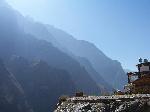
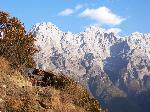
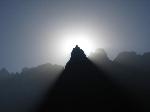

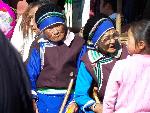
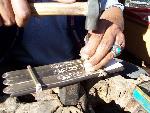
 Copyright © 1998-2026 All rights reserved.
Copyright © 1998-2026 All rights reserved.